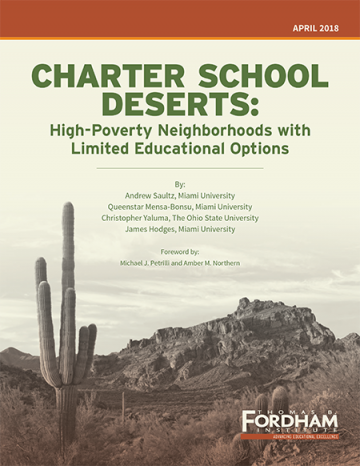How Ohio can pave the way for a stronger, broader charter movement
Aaron ChurchillComparing Ohio K–12 education to other states helps us gauge the pace of progress, provides ideas on improvement, and gets us out of our local “bubble.” In a recent post, my colleague Chad Aldis examined Ohio and Florida’s NAEP results, finding the Buckeye State wanting in terms of gains over
A tale of two charter school sectors: Ohio versus Idaho
NOTE: The Thomas B. Fordham Institute occasionally publishes guest commentaries on its blogs. The views expressed by guest authors do not necessarily reflect those of Fordham.
National Charter Schools Week: DECA High proves the possible
Marwa BerriNOTE: In honor of Teacher Appreciation Week, Fordham Ohio staffers will be blogging about teachers, principals, and guidance counselors who made a positive difference in their schooling and in their lives. This is the fourth and final post, which does double duty of celebrating National Charter Schools Week as well.
It’s time for common sense on accountability for online schools
Chad L. AldisFor charter school supporters, it can be frustrating. There’s always something new in the Electronic Classroom of Tomorrow (ECOT) saga.
Ohio to Florida: Better schools for thee but not for me?
Chad L. AldisIf you were on vacation earlier this month—lucky you—you may have missed the release of the 2017 NAEP results. On the whole, you didn’t miss much.
Charter School Deserts: High-Poverty Neighborhoods with Limited Educational Options
Andrew Saultz, Queenstar Mensa-Bonsu, Christopher Yaluma, James Hodges2016–17 was one of the slowest-growth years for charter schools in recent memory. Nobody knows exactly why, but one hypothesis is saturation: With charters having achieved market share of over 20 percent in more than three dozen cities, perhaps school supply is starting to meet parental demand, making new charters less necessary and harder to launch.
Charter schools 101: Why would we need charters in suburban, rural, or “good” districts?
By Susan Pendergrass
Behind the curtain of Ohio school choice
Jessica PoinerIn case you missed the headlines, D.C. Public Schools Chancellor Antwan Wilson recently resigned.
Howard Fuller on school segregation
On this week's podcast, Howard Fuller, renowned civil rights activist and education reformer, joins Mike Petrilli and Alyssa Schwenk to discuss school segregation. During the Research Minute, Amber Northern examines ways to help bachelor’s degrees better facilitate professional success.
Special School Choice Week edition
On this week's podcast, Mike Magee, CEO of Chiefs for Change, and Nina Rees, CEO and president of the National Alliance for Public Charter Schools, join Mike Petrilli and Alyssa Schwenk to discuss where the choice movement stands on the occasion of National School Choice Week. During the Research Minute, Amber Northern examines a study on school discipline reform in Philadelphia, complete with a jaw-dropping teacher survey.
Seven takeaways from ECOT’s potential closure
Jamie Davies O'LearyAfter losing its sponsorship, ECOT, the largest e-school in Ohio, appears to be on the brink of closure.
When a district steps up, the state should step out of the way
Jeff MurrayAs reported by the Dispatch last week, Columbus City Schools has unveiled plans to expand selective admission among its magnet schools next year. This is a positive step in an often criticized district—an effort that should be applauded and helped to grow.
First-person perspective: Personalized learning is real—and it works
Jeff MurrayIn a recent blog post, University of Virginia cognitive scientist Dan Willingham posits three possible types of personalization in personalized learning—children learning at their own speed, pedagogical tailoring, and individualized content.
Three cheers for charter leaders of color
On this week's podcast, special guest Kim Smith—CEO of the National Charter Collaborative—joins Mike Petrilli and Alyssa Schwenk to discuss single-site charter school leaders of color. During the Research Minute, Amber Northern examines Raj Chetty’s new “Lost Einsteins” study, which finds that smart low-income kids are much less likely than their affluent peers to grow up to become inventors.
A deeper look at parent power
Jamie Davies O'LearyThe annual “parent power index” published by the Center for Education Reform raises worthy questions—how much power is afforded to parents, and what can they do to acquire more?
The charter schools popularity contest
On this week's podcast, Mike Petrilli, Alyssa Schwenk, and Brandon Wright discuss why charters enjoy more support in some states than in others. During the Research Minute, Amber Northern examines the impact of administrator and parent support on teacher retention.
You’re invited to a discussion of school choice and collaborative solutions for education success
Ohio Education GadflyFor too long, the topic of school choice in Ohio has been divisive and polarizing. You are invited to attend a thoughtful and substantive discussion of school choice with experienced leaders from across the state. This effort to find common ground and collaborative solutions in support of students promises to be a great evening. We hope you can attend.
Ohio’s latest charter sponsor ratings are out: What do the numbers mean?
Jamie Davies O'LearyYesterday, the Ohio Department of Education released the second round of charter sponsor (a.k.a. authorizer) ratings.
What CER’s parent power report card gets wrong about Ohio
Jamie Davies O'LearySince 2012, the Center for Education Reform (CER) has released an annual “parent power index,”—a scorecard for states as well as an interactive tool for parents “to discover whether their state affords them power ov
Reputation or data: One parent's effort to identify "good" schools
Jeff MurrayFor the first time in their lives, my twin daughters are attending separate schools. It was a hard decision made after a lot of research and soul searching. My wife and I think both schools are good ones, but I’d be lying if I said I was 100 percent confident.
Cheer up, education reformers
On this week's podcast, Mike Petrilli, Alyssa Schwenk, and Brandon Wright discuss education reform’s surprisingly good year. During the Research Minute, Amber Northern examines a rigorous new study of career and technical education and its relationship to higher graduation rates.
Ohio charter critics now stealing metaphors from horror genre
Jamie Davies O'LearyHas William Phillis, head of the Ohio Coalition for Equity and Adequacy of School Funding and long-standing charter critic, been watching too many horror films this month?
Reinventing Andy Smarick
On this week's podcast, special guest Andy Smarick, a fellow at the American Enterprise Institute, joins Mike Petrilli and Brandon Wright to discuss his review of David Osborne’s new book, Reinventing America’s Schools. During the Research Minute, David Griffith examines how heightened parent expectations affect Chinese students born during the Year of the Dragon.
You’re invited to an important hands-on workshop: Closing the achievement gap for economically-disadvantaged students
Ohio Education GadflyThe teachers and administrators at Columbus Collegiate Academy-Main Street have a strong track record of supporting their students in closing the achievement gap and putting them on a college prep path.
Rising star
NOTES: The Thomas B. Fordham Institute occasionally publishes guest commentaries on its blogs. The views expressed by guest authors do not necessarily reflect those of Fordham.
Schools were made to help students, not the other way around
Jamie Davies O'LearyIt’s frustrating feeling like a broken record, but Stephen Dyer’s comparisons between school districts and charter schools can’t go uncontested.
The state of early childhood education
On this week's podcast, special guest Sara Mead, a partner at Bellwether Education, joins Alyssa Schwenk and Brandon Wright to discuss the past, present, and future of early childhood education. During the Research Minute, Amber Northern examines the positive effects of education reform in Newark, New Jersey.
Compassion and academic rigor not mutually exclusive for kids in poverty
Jamie Davies O'LearyI recently visited United Preparatory Academy (UPrep). It’s a charter school serving students in grades K-4 (growing to grade five) located in Franklinton—one of Columbus’s poorest neighborhoods, where the median household income is thirty percent lower than the city-wide average.



